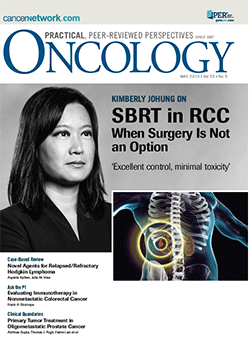FDA Approves Two New Indications and Dosage Form for Pembrolizumab
In this installment of Oncology Drug Updates, updates to FDA approvals for pembrolizumab in the treatment of lung cancer and RCC are highlighted.
Oncology (Williston Park). 33(5):186.

The US Food and Drug Administration (FDA) recently approved a new dosage form and two new indications for pembrolizumab (Keytruda) in non–small-cell lung cancer (NSCLC) and renal cell carcinoma (RCC).[1,2] Key information about these updates is highlighted below.
New Indication for NSCLC
In April 2019, the FDA approved pembrolizumab for the first-line treatment of stage III NSCLC patients who are not candidates for surgical resection or definitive chemoradiation, and for those with metastatic NSCLC. Patients’ tumors must have no EGFR or ALK genomic aberrations, and must express programmed death ligand 1 (PD-L1; Tumor Proportion Score [TPS] ≥ 1%), per an FDA-approved test.[1]
This approval was based on KEYNOTE-042, which evaluated 1,274 patients with stage III or IV NSCLC who had not received systemic treatment for metastatic NSCLC and whose tumors expressed PD-L1 (TPS ≥ 1%). Participants received 200-mg intravenous (IV) pembrolizumab every 3 weeks or investigator’s choice of a carboplatin-based regimen with pemetrexed or paclitaxel. Statistically significant improvements in overall survival (OS) were seen with pembrolizumab in all three populations studied. Median OS was as follows for the pembrolizumab vs chemotherapy arms, respectively: TPS ≥ 1%: 16.7 vs 12.1 months (hazard ratio [HR], 0.81; 95% CI, 0.71–0.93; P = .0036); TPS ≥ 20%: 17.7 vs 13.0 months (HR, 0.77; 95% CI, 0.64–0.92; P = .004); and TPS ≥ 50%: 20 vs 12.2 months (HR, 0.69; 95% CI, 0.56–0.85; P = .0006).[1,3]
Adverse reactions (≥ 10% of patients) with pembrolizumab were fatigue, decreased appetite, dyspnea, cough, rash, constipation, diarrhea, nausea, hypothyroidism, pneumonia, pyrexia, and weight loss. The recommended dose of pembrolizumab for NSCLC is a 200-mg IV infusion over 30 minutes once every 3 weeks.[1,3]
New Indication for RCC
The FDA also approved pembrolizumab plus axitinib for the first-line treatment of advanced RCC last month.[2] This approval was based on KEYNOTE-426, which evaluated 861 patients who had not received systemic therapy for advanced RCC. Patients received 200-mg IV pembrolizumab every 3 weeks plus 5-mg oral axitinib twice daily or 50-mg oral sunitinib once daily for 4 weeks followed by no therapy for 2 weeks. A statistically significant improvement in OS was seen with pembrolizumab/axitinib (HR, 0.53; 95% CI, 0.38–0.74; P < .0001). The 12-month OS rate was 90% vs 78% for pembrolizumab/axitinib vs sunitinib.[2,4]
Grade 3/4 hepatotoxicity occurred in 20% of patients, 13% of whom discontinued pembrolizumab or axitinib. Common adverse reactions with pembrolizumab/axitinib (≥ 20% of patients) were diarrhea, fatigue/asthenia, hypertension, hypothyroidism, decreased appetite, hepatotoxicity, palmar-plantar erythrodysesthesia, nausea, stomatitis/mucosal inflammation, dysphonia, rash, cough, and constipation. The recommended dose for RCC is 200-mg pembrolizumab every 3 weeks plus 5-mg oral axitinib twice daily.[2,4]
New Dosage Form
Lastly, the FDA approved a new dosage form for pembrolizumab: 50 mg of lyophilized powder shipped in a single-dose vial to be reconstituted and used as an injection solution.[5]
Financial Disclosure:The authors have no significant financial interest in or other relationship with the manufacturer of any product or provider of any service mentioned in this article.
References:
1. U.S. Food & Drug Administration. FDA expands pembrolizumab indication for first-line treatment of NSCLC (TPS ≥ 1%). https://www.fda.gov/Drugs/InformationOnDrugs/ApprovedDrugs/ucm635857.htm. Updated April 12, 2019. Accessed April 24, 2019.
2. U.S. Food & Drug Administration. FDA approves pembrolizumab plus axitinib for advanced renal cell carcinoma. https://www.fda.gov/Drugs/InformationOnDrugs/ApprovedDrugs/ucm636395.htm. Updated April 24, 2019. Accessed April 24, 2019.
3. Mok TSK, Wu WL, Kudaba I, et al. Pembrolizumab versus chemotherapy for previously untreated, PD-L1-expressing, locally advanced or metastatic non-small-cell lung cancer (KEYNOTE-042): a randomized, open-label, controlled, phase 3 trial. Lancet. 2019 Apr 4. [Epub ahead of print]
4. Rini BI, Plimack ER, Stus V, et al. Pemrolizumab plus axitinib versus sunitinib for advanced renal-cell carcinoma. N Engl J Med. 2019;380:1116-27.
5. U.S Food & Drug Administration. Drugs@FDA. KEYTRUDA® (pembrolizumab) powder. https://www.accessdata.fda.gov/drugsatfda_docs/label/2019/125514Orig1s054lbl.pdf. Accessed April 24, 2019.
